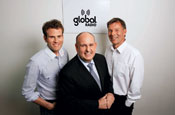In the space of eight months, Global Radio has come from nowhere to the brink of becoming the dominant force in UK commercial radio.
If, by the 26 March deadline, Global's latest share offer for GCap Media forces its chief executive, Fru Hazlitt, to bow to shareholder pressure and accept the bid, Global will have a 43% share of the total commercial audience share.
It will marry Capital, Classic FM and Xfm to Global's portfolio of Heart, Galaxy and LBC, which it acquired for £170m from Chrysalis last July.
For GCap, it will be the end of an era and final proof that in media mergers - in its case between Capital and GWR - the whole is sometimes less than the sum of its parts.
For Hazlitt, who only last month made a last-ditch attempt to keep the firm out of Global's grasp, announcing a raft of cost-cutting measures, it is something of a humiliation. Conversely, for Global, and its 30-year-old founder and chief executive Ashley Tabor, it represents an audacious and ambitious move into a market whose future is by no means certain.
Tabor began his career at Capital Radio before joining 19 Entertainment. He then set up talent management company Global Talent in 1998 followed by talent-spotting company Global Publishing two years later.
When he set his sights on breaking into the UK radio sector, Tabor secured backing from wealthy Irishmen JP McManus, John Magnier and Dermot Desmond, employed former ITV chief executive Charles Allen as chairman and took on veteran programme director Richard Parks as executive director.
Tabor's entrepreneurialism and ambition are apparent, his strategy is less clear; how will he make a success of running a radio group where so many others have failed? Unfortunately, Tabor has made no comment on the matter other than issuing a statement, that reads: 'Global Radio strongly believes that a combination of its brands with those of GCap will create a strong and vibrant company that will be able to breathe fresh life into Britain's commercial radio sector.'
This begs the question as to what the industry can expect. The appointment of Allen is one revealing aspect, according to Cathy Lowe, head of radio at PHD. 'His reputation goes before him - he was brought in to ensure that whatever Global buys is run as a tight, lean company,' she says.
Indeed, if Allen intends to replicate the strategy he adopted when merging Carlton and Granada, it could entail some ruthless cost-cutting. Nonetheless, Lowe is pleased that Allen will be partnering Parks, the man responsible for making Capital a success in the 80s.
'The combination with Richard, who is creative, is quite compelling,' she says. She also believes that Global's marketing director, Nicola Thomson, hired from Emap, where she was Magic's marketing director, is an inspired move. Thomson, says Lowe, deserves credit for helping take the station to the number-one spot in London.
However, even assuming that Tabor and his team can achieve the levels of success they have enjoyed in the past, there are bigger, structural issues affecting radio that they will need to address. Although ad radio revenue has held up relatively well - it increased 7.1% year on year in the last quarter of 2007, with total revenue for the period reaching £150,949,721, according to the RadioCentre - confidence in the medium has been rocked by uncertainty over its digital future.
Martin Sambrook, managing partner at media consultancy Billetts, believes there are serious questions about what it means for the future of commercial radio. 'What is the strategy? Further retrenchment to fund the acquisition or a positive and coherent digital strategy to develop the potential of digital?' he asks. 'Advertisers will need a foot in digital radio, as in other digital media, so let's see what the long-term strategic intent is; a short-term response will deliver only short-term results. Advertisers need an innovative radio medium.'
For Tabor, Allen and Parks, balancing the demands of cutting costs while investing in the digital future might prove a tricky act to pull off.


